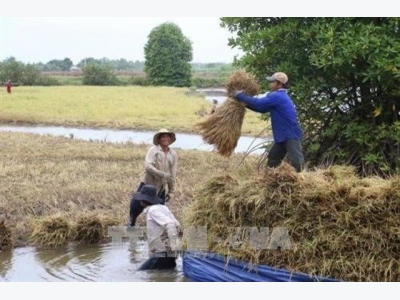Farmers earn high profits from clean shrimp-rice cultivation

Farmers in Ben Tre province’s Thanh Phu district harvest organic rice. Photo: VNA)
Ben Tre (VNA) - Farmers in Ben Tre province’s Thanh Phu district have earned high profits from rotating rice and shrimp cultivation in the same rice field.
Farmers in the coastal district grow rice in the rainy season when fresh water is available and breed “clean” shrimp or other aquatic species in the dry season when saline water intrusion occurs.
In An Nhon commune, which has more than 7,000ha of rice, most farmers are now growing clean rice or organic rice.
Farmers use chemical fertilisers for clean rice and organic fertilisers for organic rice, while no pesticides are used for clean rice or organic rice.
When rice fields are infected with brown planthoppers, farmers allow water to enter the fields and submerge rice plants to their tops to kill the pests.
Le Van Mien, who owns a 1.3ha rice field in An Nhon’s An Hoa hamlet, said he has grown organic rice for three years and that all of his rice is guaranteed an outlet by a company.
In 2017, he received 8,500 VND a kg for his rice, 1,000 VND higher than the market price.
Farmers face difficulties when growing organic rice for some crops as the output of organic rice fields is lower than that of clean rice fields, he said.
“However, the output of organic rice fields will increase steadily after each crop,” he said.
Farmer Le Van Phuc in the same hamlet said the average profit for organic rice is 3 million VND (130 USD) per 1,000 sq.m.
Rice fields also have a lot of algae after organic rice is harvested, providing food for shrimp, fish and crabs, he said.
The cost of fertilisers used for organic rice fields is 40 percent less than the price for clean rice fields, he said.
With the success of the rice-shrimp cultivation model in recent years, many farmers in the district who moved to other provinces to work have returned home to grow rice and shrimp.
Ho Van Cuong, deputy chairman of the An Nhon Commune Farmers Association, said the rate of poor households in An Nhon had fallen to 6 percent now compared to 30 percent three years ago. The lives of farmers have improved, he said.
In 2016, the National Office of Intellectual Property of Vietnam granted the collective brand name of Thanh Phu Clean Rice in the district.
Truong Thanh Hai, head of Thanh Phu district's Agriculture and Rural Development Division, said that after the collective brand name was granted, farmers’ awareness about clean rice improved.
The district has regularly organised training courses on farming techniques for clean rice, he said.
Farmers in the district have set up shrimp-rice cultivation co-operative teams to exchange information about farming techniques, diseases and prices.
The district has 25 co-operative teams as well as the Thanh Phu Clean Rice Cooperative.
District farmers have planted 6,500ha of rice with an average yield of 4.5 tonnes per ha under the shrimp-rice cultivation model last year, according to the division.
The average yield of organic rice field is 300 kilo per ha more than clean rice fields, said the bureau.
Hai said besides explaining the benefits of growing organic rice to farmers, the district is trying to develop an organic shrimp cultivation model in rice fields
Có thể bạn quan tâm
 Agricultural restructuring in response to climate change
Agricultural restructuring in response to climate change As a country seriously affected by global climate change, Vietnam considers adaptation to climate change vital to socio-economic development
 Fruit, vegetables become big foreign currency earner
Fruit, vegetables become big foreign currency earner Fruit and vegetables have surpassed traditional farm produce such as rice, rubber, tea, and cashew nuts to become a major foreign currency earner
 The paradox of Vietnamese coffee industry
The paradox of Vietnamese coffee industry In 2017, Vietnam’s coffee exports hit 1.42 million tons, tallying in at US$3.21 billion, a year-on-year decrease of 20.2% in volume and 3.8% in value.